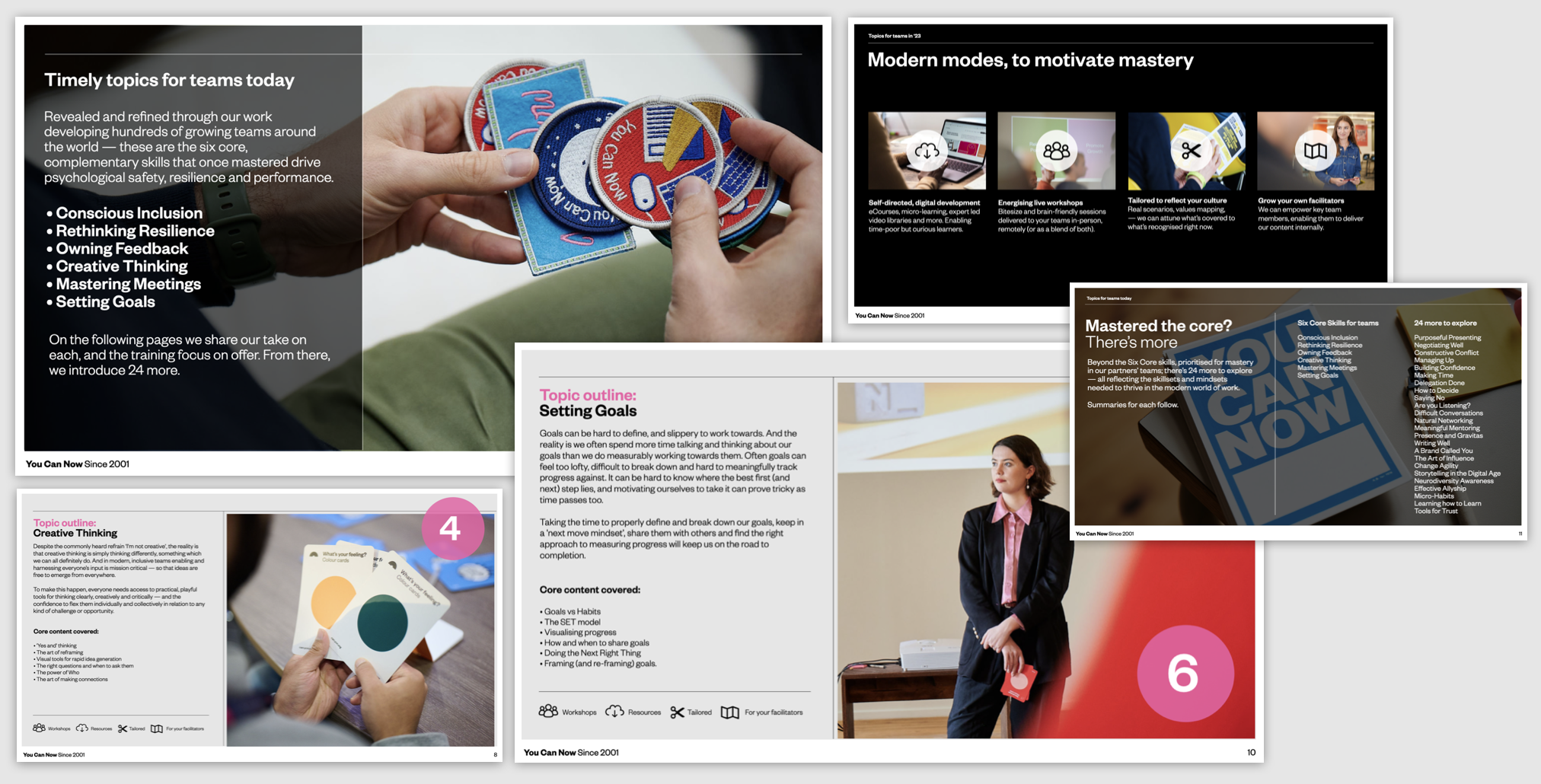Timely training for teams

From energising workshops, to self-serve tools, personalised pathways to peer-learning groups — our modern mix is measured against the moments that matter most.
How we can help

Standalone session, or ongoing programmes; our expert facilitators energise and motivate teams towards experimentation — whether in-person, virtually or hybrid.

Accessible on our platform, or imported to your own — blended, social and experimental learning pathways bring development to life at any pace preferred.

Bitesize digital and physical tools keep core concepts covered in minds, hand and conversations — all within the flow of work.
Our people-powered platform offers teams on-demand access to in-demand skills; collaboratively connecting them with subject experts, and a community of supportive peers.
Who we're helping

Modern, growing organisations
The workshops always bring a big burst of energy and new things to take straight back to my teams. You're brilliant at boiling down big ideas, and inspiring us to experiment.
Popular topics with teams today

Embracing a mindset of conscious inclusion, and championing the behaviours that embody it every day.

When we get clearer about what is in our control, and shift our mindset from ‘Me’ to ‘We’ — we’re able to get tactical and practical.

In modern teams, feedback is a must-have; something we must continually improve our ability to give and receive effectively.

Despite the commonly heard refrain 'I'm not creative', the reality is that creative thinking is simply thinking differently, something we can all do.

Modern meetings should create energy, pull in everyone’s perspectives, lead to good decisions and create clarity on action. Do yours?

Goals can be hard to define, and work towards. And we often spend more time talking and thinking about our goals than we do progressing.
In this punchy PDF we summarise the core topics we’re tackling together with our partners’ teams today — through energising live workshops, digital tools and self-led learning.

We all know a good presenter when we see one — they make it look easy. But if we want to get better, where do we begin?

When we negotiate well, not only do we arrive at outcomes that further our cause, but we enrich the relationships that matter the most to us.

Conflict is inevitable. And in the everyday flow of work we all experience disagreements, clashing opinions, mis-aligned values and more.

The idea of 'managing upwards' has risen in popularity, in fast-moving environments where change is a constant and responsibilities are blurred.

Confidence is a concept that we can struggle to agree on a consistent definition of. But what's familiar is that first-hand feeling of lacking it.

Perhaps our most precious resource, time is so often something we don't use with intention or protect with purpose.

When delegation well, you'll purposefully lighten your load and free up focus — all while empowering and enabling the development of others.

By practicing fundamental mental checks, we can lessen the chance of poor consideration and optional paralysis.

Most days, most of us are fielding requests. From all kinds of quarters — bosses, colleagues, family members, strangers are all after something

We can think of listening as a 'tipping point' skill, as once mastered it unlocks so much else.

Conversations can easily arise on sensitive, awkward topics — which in turn evoke strong emotions and relational friction.

Networking's not often something that we actively want to 'do'. It's easily perceived as necessary evil in the modern, connected world of work.

Mentoring someone else offers is the chance to build, flex and apply some of the most vital communication and relational skills needed at work.

Gravitas, a sense of 'weight or authority', is often thought as a natural ability, something you've either got or you haven't.

Words count. And in these distributed working times, the emphasis on being clear in our written communication is greater than ever.

Considering, and defining a strong personal brand, can help us all in many ways. It

If you know you deserve to be heard, want to make a difference or change something, then working on your influencing skills is going to be important.

It’s nearly 3000 years since Heraclitus observed that “the only constant in life is change”.

Not long ago, when planning some communication — our choices of where to put our message was pretty limited. Today the opposite's true.

Neurodiversity has rapidly emerged as an important topic for conversation, within the modern DE&I agenda.

Unchecked privilege, inherent bias, clumsy communication and unhelpful practices still have a hold in today's world of work.

We often think that meaningful change comes from deciding on (and then smartly defining) big goals.

Making the time to actively advance our development, and to demonstrate what it’s enabling us to do more effectively, is critical for our progression.

Trust is at the heart of all successful relationships — whether with our teams, clients or peers.
As modern teams become flatter — supporting each other’s daily development as peers is becoming a purposeful, and performance-enhancing pursuit.
We help our partners to kickstart conversations, and embed inclusive practices into their working cultures — through a blend of development formats, and a diverse community of experts.




